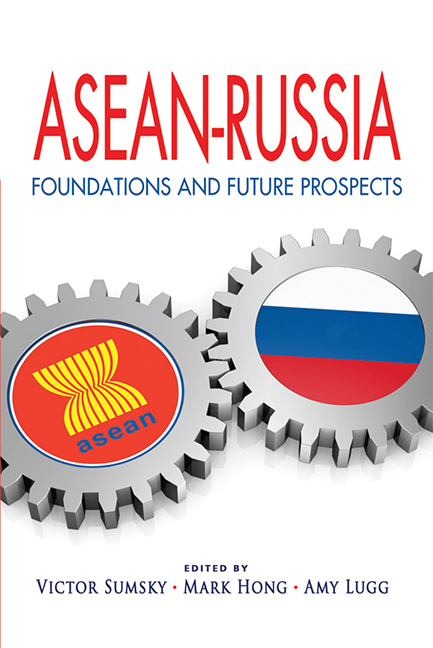Book contents
- Frontmatter
- Contents
- Foreword
- Preface
- About the Contributors
- Keynote Address
- Opening Remarks
- Keynote Address
- Introduction: Russia and the ASEAN Member States: Political and Economic Cooperation in Progress
- SECTION I WISEMEN'S VIEWS
- SECTION II GEOPOLITICS
- SECTION III BILATERAL RELATIONS
- SECTION IV Business and Economics
- SECTION V CULTURE AND EDUCATION
- EPILOGUE
- Index
Keynote Address
Published online by Cambridge University Press: 21 October 2015
- Frontmatter
- Contents
- Foreword
- Preface
- About the Contributors
- Keynote Address
- Opening Remarks
- Keynote Address
- Introduction: Russia and the ASEAN Member States: Political and Economic Cooperation in Progress
- SECTION I WISEMEN'S VIEWS
- SECTION II GEOPOLITICS
- SECTION III BILATERAL RELATIONS
- SECTION IV Business and Economics
- SECTION V CULTURE AND EDUCATION
- EPILOGUE
- Index
Summary
INTRODUCTION Russia and the Association of Southeast Asian Nations (ASEAN) countries do not have a habit of looking at each other as natural partners. Honestly, only a few of my compatriots, mostly advanced students of international relations, would be able to name the ten ASEAN member states. Looking from this part of the globe, Russia is also not too visible. It is not perceived as a relevant factor in regional affairs. This traditional neglect is short-sighted and outdated on both sides. We do matter to each other.
WHY DO WE MATTER?
Russia matters because it is an important country. Unlike the USSR, it is not a superpower, but it is one of the great powers. It accounts for one-eighth of the Earth's surface, being the biggest Asian state with the longest Pacific coast. With a population of 142 million people, not too big by Asian standards, Russia is the largest European nation. It is one of the five permanent United Nations (UN) Security Council members. It is number one in the world as the supplier of energy, in natural resources, in nuclear might, and in space research. It is the seventh to eighth largest economy, still much bigger than that of ASEAN's ten economies combined. Russia has a great culture, and the Russian language (an official one in the UN) is the fifth most frequently spoken on Earth. And now Russia starts looking more and more to the southeast of its borders.
ASEAN matters for Russia because it is an extremely important and interesting group of rapidly growing countries, representing a distinct civilization of 600 million people. One of the paradoxes of the Asia Pacific is that although there are many great powers in the region, ASEAN countries have traditionally been the centre and the driving force behind the regional integration processes. The twenty-seven-nation ASEAN Regional Forum (ARF), which includes the Russian Federation, functions as the main venue of regional political dialogues on peace and stability, cooperation in security and confidence-building measures. The dialogues with leading partners (known as ASEAN+1) play an increasingly important role. Cooperation with China, Japan and South Korea in ASEAN+3 has been gaining momentum, and now there is ASEAN+8 (which again includes Russia).
- Type
- Chapter
- Information
- ASEAN-RussiaFoundations and Future Prospects, pp. xli - lPublisher: ISEAS–Yusof Ishak InstitutePrint publication year: 2012

